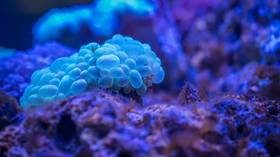Researchers 3D PRINT artificial corals which could save natural reefs, cut greenhouse gases

Drawing on inspiration from nature, researchers have developed 3D-printed, coral-like structures capable of growing vast amounts of microscopic algae, in a welcome move for the environment and conservationists around the world.
The teams from Cambridge University and the University of California San Diego scanned living corals with a type of light-based ultrasound called ‘optical coherence tomography’ so they could optimize their designs based on nature's best and brightest reefs.
Corals and algae have a symbiotic relationship, in which the former provides a host while the latter provides sugars through photosynthesis, creating one of the most diverse and beneficial ecosystems on Earth.
The team took their nature-inspired blueprints and used a rapid 3D bioprinting technique – originally used to make artificial liver cells – to produce dense populations of microscopic algae that grew at 100 times the normal rate.
Also on rt.com 3D printer that could cover burns with ARTIFICIAL SKIN undergoing trials (VIDEO)"We developed an artificial coral tissue and skeleton with a combination of polymer gels and hydrogels doped with cellulose nanomaterials to mimic the optical properties of living corals," said Dr Silvia Vignolini, who led the research.
The artificial coral structures, made of biocompatible materials, were extremely efficient at redistributing light – providing hopes of creating artificial coral reefs to help sustain a vital natural structure and resource.
The team’s research will allow conservationists and marine biologists to better understand the breakdown of natural coral reefs, and hopefully help turn the tide of natural reef loss.
The researchers are now hoping to scale their product up while mass-manufacturing bioproducts such as algae-based biofuels in developing countries, while simultaneously reducing greenhouse gases which cause coral reef death.
Think your friends would be interested? Share this story!














